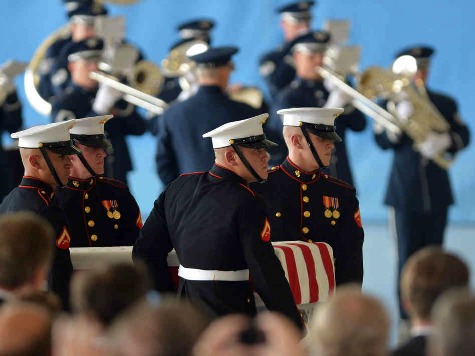

The flag draped coffin of Ambassador Stevens being carried by U.S. Marines Honor Guards. Stevens was brutally tortured, raped and murdered during the armed assault against the U.S. Diplomatic Mission in Benghazi Libya on the anniversary of the 9-11 attacks against America. Report suggests that security was “grossly inadequate.”
A House Committee report 113-226, cited numerous security deficiencies in regard to security at the U.S. Diplomatic mission in Benghazi, Libya.
The report noted:
“The September 11, 2012 terrorist attacks on the U.S. special mission compound and annex in Benghazi, Libya claimed the lives of four dedicated Americans and yet again highlighted the potential vulnerability of our facilities and personnel overseas. The subsequent Accountability Review Board (ARB) report cited numerous security deficiencies and made 29 key recommendations across six core areas:
1) overarching security considerations
2) staffing high risk, high threat posts
3) training and awareness
4) security and fire safety equipment
5) intelligence and threat analysis
6) personnel accountability.”
The House Committee on Foreign Affairs considered the recommendations of the ARB in the context of the global threats to U.S. facilities and personnel overseas. As the ARB report stated:
“The Benghazi attacks took place against a backdrop of significantly increased demands on U.S. diplomats to be present in the world’s most dangerous places to advance American interests and connect with populations beyond capitals, and beyond host governments’ reach. With State Department civilians at the forefront of U.S. efforts to stabilize and build capacity in Iraq, as the U.S. military draws down in Afghanistan, and with security threats growing in volatile environments where the U.S. military is not present–from Peshawar to Bamako–the Bureau of Diplomatic Security (DS) is being stretched to the limit as never before.
“The Benghazi attacks also took place in a context in which the global terrorism threat as most often represented by al Qaeda (AQ) is fragmenting and increasingly devolving to local affiliates and other actors who share many of AQ’s aims, including violent anti-Americanism, without necessarily being organized or operated under direct AQ command and control. This growing, diffuse range of terrorist and hostile actors poses an additional challenge to American security officers, diplomats, development professionals and decision-makers seeking to mitigate risk and remain active in high threat environments without resorting to an unacceptable total fortress and stay-at-home approach to U.S. diplomacy.”
The ARB report concluded that “Systemic failures and leadership and management deficiencies at senior levels within two bureaus of the State Department resulted in a Special Mission security posture that was inadequate for Benghazi and grossly inadequate to deal with the attack that took place,” and suggested that future ARBs be empowered to recommend disciplinary action for such leadership and management deficiencies going forward. The ARB also said that security in Benghazi was not viewed as a `shared responsibility’ by the bureaus in Washington with the task of supporting the mission, resulting in stove-piped discussions and decisions that led to an inadequate security posture; problems that H.R. 2848 attempts to mitigate. Additionally, the ARB recommended that more resources be directed to addressing the security needs of the Department. H.R. 2848 is an important and responsible response to both these fiscal and accountability concerns, and fully funds the Embassy Security, Construction, and Maintenance and Worldwide Security Protection requests for fiscal year 2014″ (source: House Committee Report 113-226 – DEPARTMENT OF STATE OPERATIONS AND EMBASSY SECURITY AUTHORIZATION ACT, FISCAL YEAR 2014 http://thomas.loc.gov).
See related Video of Benghazi attack in Libya http://www.youtube.com/watch?v=PxGjTR3QVgQ
